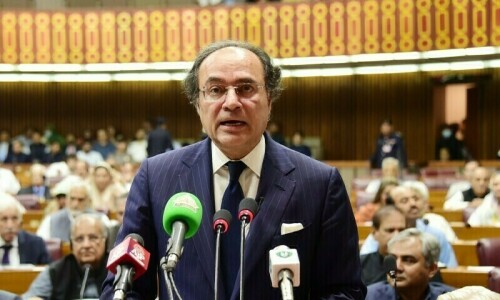THESE have been a frenzied few weeks for the region. Pakistan's relations with America had barely hit another roadblock over the Haqqani network when President Karzai issued statements after the assassination of Burhanuddin Rabbani describing Pakistan as a stumbling block for peace in Afghanistan. Now comes the signing between India and Afghanistan of what the two countries are calling a Strategic Partnership Agreement. While the pact was reportedly in development for some time, the timing of the announcement — or perhaps the decision not to delay it despite recent events — also turns it into a signal from President Karzai to Pakistan that he has other friends in the region. On Wednesday he said the agreement will not affect ties with Pakistan, but given the region's dynamics there is no doubt it will raise eyebrows among the establishment here and possibly lead to ill-advised efforts to ramp up Pakistani involvement in Afghanistan as well.
And while India is already the largest regional donor to Afghanistan, this does not seem to be a routine diplomatic celebration of friendly ties. The pact is a wide-ranging one that specifies trade initiatives and Indian assistance for development, education, and Afghan government capacity-building, as well as political and security collaboration, including training and equipment for the Afghan National Security Forces, regular political contact, and cooperation at the United Nations. While there has been limited Indian training of Afghan security forces in the past, the specific mention of it in the agreement indicates an intention to step it up significantly. This has the potential to increase mistrust in the region; in fact, WikiLeaks cables have revealed how wary even the Americans have been — in the past, at least — of either Indian or Pakistani military assistance in Afghanistan.
This latest agreement only adds to the impression that regional players are beginning to shape their respective alliances in a part of the world whose future seems increasingly unpredictable. Soon after American allegations regarding the Haqqani network, Pakistan was busy welcoming Chinese and Iranian representatives to the country. And given its history of turmoil, Kabul's search for allies it can trust is understandable. But this diplomatic manoeuvring should also be a sign for Pakistan that it needs to reassure Kabul it will not seek to use Afghanistan for strategic depth to the detriment of that country, and instead is simply concerned that Afghan territory not be used against it. Both for the sake of peace in the region and for its own interests, Pakistan needs to see this latest development as a reason to reduce the trust deficit in its own relationship with Afghanistan.












































Dear visitor, the comments section is undergoing an overhaul and will return soon.